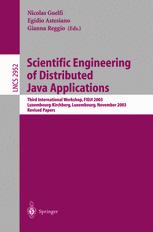

Most ebook files are in PDF format, so you can easily read them using various software such as Foxit Reader or directly on the Google Chrome browser.
Some ebook files are released by publishers in other formats such as .awz, .mobi, .epub, .fb2, etc. You may need to install specific software to read these formats on mobile/PC, such as Calibre.
Please read the tutorial at this link: https://ebookbell.com/faq
We offer FREE conversion to the popular formats you request; however, this may take some time. Therefore, right after payment, please email us, and we will try to provide the service as quickly as possible.
For some exceptional file formats or broken links (if any), please refrain from opening any disputes. Instead, email us first, and we will try to assist within a maximum of 6 hours.
EbookBell Team

5.0
60 reviewsFIDJI 2003 was an international forum for researchers and practitioners in- rested in the advances in, and applications of, software engineering for distri- ted applicationdevelopment. Concerningthe technologies,the workshopfocused on “Java-related” technologies. It was an opportunity to present and observe the latest research, results, and ideas in these areas. Allpaperssubmittedtothisworkshopwerereviewedbyatleasttwomembers of the International Program Committee. Acceptance was based primarily on originality and contribution. We selected, for these post-workshop proceedings, 14 papers, amongst 29 submitted, two tutorials, and one keynote talk. FIDJI2003aimedatpromotingascienti?capproachtosoftwareengineering. The scope of the workshop included the following topics: – design of distributed Java applications – Java-related technologies – software and system architecture engineering and development methodo- gies – development methodologies for UML – development methodologies for reliable distributed systems – component-based development methodologies – managementofevolutions/iterationsintheanalysis,design,implementation, and test phases – dependability support during system life-cycles – managing inconsistencies during application development – atomicity and exception handling in system development – software architectures, frameworks, and design patterns for developing d- tributed systems – integration of formal techniques in the development process – formal analysis and grounding of modeling notation and techniques (e. g. , UML, metamodeling) – supporting the security requirements of distributed applications in the - velopment process – refactoring methods – industrial and academic case studies – development and analysis tools The organization of such a workshop represents an important amount of work.